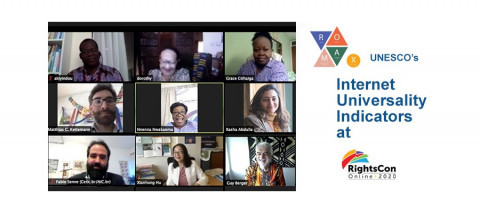“It’s important to highlight the human rights dimension of the Internet in the assessment grounded on a package of ROAM principles encompassing human Rights, Openness, Accessibility, and Multi-stakeholder participation,” said Guy Berger, UNESCO Director for Strategies and Policies in the Field of Communication and Information.
Mr Berger explained that a national assessment of Internet Universality Indicators upholds an international standard that aims to improve human rights around the world in order to inform local recommendations for a better Internet in the country concerned.
“The national assessments progressing in above 20 countries illustrate well how the ROAM principles and indicators could contribute to safeguarding online human rights and advancing Internet development in a holistic approach,” noted Xianhong Hu, the UNESCO focal point of the Internet Universality project.
She moderated the session by dialoguing with five experts who are leading the assessments in Ghana, Germany, Benin, Kenya and Brazil. Ms Hu stated: “The Covid-19 pandemic has reminded the world of the importance of the Internet, and UNESCO has also re-affirmed more than ever the relevance of the UNESCO’s Internet Universality Principles.”
Representing the two newly launched assessments in Ghana and Germany, Dorothy Gordon, UNESCO’s Chair of IFAP (Information for All Programme), and Dr Matthias Kettemann, Leibniz Institute for Media Research/Hans Bredow Institute confirmed that an inclusive and gender balanced Multi-stakeholder Advisory Board (MAB) has been established to guide the national assessments in both countries.
Ms Gordon stated: “Topics such as data sovereignty, digital imperialism and privacy, are in the forefront of our thinking to cope with the pandemic. The whole process linked with the Internet Universality indicators assessment allows us to bring more people in the conversation to tackle Internet governance related issues. The Covid-19 pandemic highlighted the fact that too many policies are tech-oriented, but the UNESCO’s Internet Universality ROAM principles and indicators broaden that discussion.”
In his remarks, Dr Ketteman said: “Even for a developed country such as Germany, issues related to accessibility and human rights of Internet such as privacy are still relevant and prevent people from taking part in full-fledged knowledge societies”. Regarding the challenges Germany is facing in the completion of their national assessment, he explained that “the data gathering process can be difficult: we have to look at all the indicators and treat them fairly but we cannot go into details with each one of them due to the different specifics of German federal states”.
On the assessment in Kenya, Grace Githaiga representing KICTANET said: “The most striking finding of the ROAM-X assessment in Kenya was the lack of data from institutions and governmental bodies”. She explained that researchers were unable to track marginalized groups and thus formulate appropriate policy recommendations including in some of areas of online freedom of expression, privacy and content regulation.
“In Benin, the striking impact of the Internet Universality indicators assessment was the government has quickly followed and implemented the policy recommendations by creating a platform to counter the lack of data and to give researchers access to relevant data,” said Dr. Alain Kiyindou, Professor and Researcher, Université Bordeaux Montaigne.
"A framework on the ethics and human-rights in Artificial Intelligence (AI)to foster national AI strategy is also underway” he added.
Fabio Senne, representing the Regional Center for Studies on the Development of the Information Society (Cetic.br), highlighted that Brazil was a unique case because it participated in the consultation phase and testing of the UNESCO indicators at the very beginning of the development process. The assessment was well supported by the Multi-stakeholder Advisory Board represented by Brazilian Internet Steering Committee (CGI.br), he stated.
In his perspective, the main strength of the Internet Universality framework was its holistic approach and identification of the institutional changes needed for Brazil to fully implement policy recommendations and reforms tackling emerging challenges of privacy protection and countering disinformation.
All the experts agreed that the multi-stakeholder approach and its diversity was necessary to successfully conduct a national assessment and that a monitoring mechanism needs to be put in place to support the implementations of the policy recommendations after the completion of the assessments.
Mr Berger closed the session by informing that UNESCO is launching a Dynamic Coalition of Internet Universality at the Internet Governance Forum in 2020. There are also plans to develop an online platform with Indicators generated by UNESCO to allow for worldwide sharing of data and knowledge of the indicators assessments. The national assessment reports of Benin, Senegal and Kenya have been finalized and will be published by UNESCO as the new editions of Series of Internet Universality National Assessments in the coming months.
In November 2015, UNESCO’s 38th General Conference endorsed the concept of Internet Universality, embracing four ROAM principles: an acronym for Rights, Openness, Accessibility to all, and Multistakeholder participation. UNESCO recognizes these four “pillars” underpin the growth and evolution of the Internet, fundamental to the development of the Internet, in ways that are conducive to achieving the Sustainable Development Goals.
The Internet Universality ROAM-X Indicators framework is a set of 303 indicators that aim to assess how well national stakeholders, including governments, companies, and civil society perform in adhering to the ROAM principles of Rights, Openness, Accessibility, and Multi-stakeholder participation. The framework also includes 79 cross-cutting Indicators (category X) concerning gender and the needs of children and young people, sustainable development, trust and security, and legal and ethical aspects of the Internet.
Developed over a three-year process of global and inclusive consultations with stakeholders, the indicators were endorsed for voluntary implementation in November 2018 by the 31st Council of the International Programme for the Development of Communication (IPDC). Since then, UNESCO has been working with stakeholders and encouraging more countries to implement national assessments of Internet development using the Indicators.
More information on the Internet Universality Indicators project, along with the full version of Internet Universality indicators in English, French and Spanish, is available at: https://en.unesco.org/internetuniversality.
URL:


